Just read an interesting blurb over at videogamer.com in which Wheelman Creative Director Simon Woodroffe comments on one of the biggest challenges in making effective use of off-the-shelf engine technology. He says:
“… you know, the biggest factor that hasn’t been touched upon in recent articles is the shared knowledge. We have 600 to 700 devs, all with Unreal experience, all working for the same company, all of whom can talk to each other. When we hit a problem, we have more people working on the engine than anybody – by a long way. And we have a massive pool of resources to draw upon. At least one team has dealt with pretty much every feature you might want in a next-gen game. Which means that we, as designers, are in a great position – because we can actually build games to be games, not just technology showcases any more,”
Now there are two things I find interesting about this. First that James Orry, the guy writing the article, decided to turn Simon’s insightful comments into mudslinging – by giving the article this headline: “Midway: Secret game looks ‘better’ than Gears 2”. Ahem. That’s not the point. But then videogamer.com isn’t Gamasutra, and perhaps we shouldn’t expect anything different from a news site targeted at gamers, not game makers.
Next, I’d like to say “amen” to the idea of shared knowledge! Be it within a development studio where there are multiple teams, or within a publishing organization where there are teams spread around the world, or within the industry – between two “rival” companies who are using the same technology. Honestly, I think the industries “lack of sharing” is one of the biggest spoilers to rapid advancement of games as an art form.
Think about it this way: When film makers get together to do their thing they pull together a “one time use” team made up of the best people they can get their hands on. People from all over the world converge on a project – a DP from London, a Director from LA, a Writer from Sydney, and a whole crew of visual effects people, technicians, lighting people, etc, etc. Each and every one of them bringing unique and valuable knowledge from their personal history of making films.
Compare this to the game industry where people don’t bounce around project-to-project and where our toolsets might vary widely from studio to studio and generation to generation (of code and hardware). In an environment like ours it makes sense to pool our knowledge and share our resources – especially when so many of us are using a common tool like the Unreal Engine.
Epic does what they can to foster this sort of sharing with their UDN (Unreal Developers Network). But developers and publishers could and should go one step further by pushing their knowledge, their tools, and their solutions to interesting problems and challenges out to communal repositories. Who wouldn’t love to “harvest” the latest and greatest tricks from recently released titles? And why not? Once a cool concept is released in a retail product other are going to do their best to copy it. Nothing is truly proprietary for long.
Our goal as an industry is to entertain. We do that by making the most immsersive and compelling entertainment products possible. And doing so requires a huge wealth of knowledge which every team in the world possesses bits of pieces of. Sharing knowledge with each other would help our studios, nurture the industry, and ultimately deliver better games to audience.
We do some pretty amazing things as individual teams – imagine what we might do as a unified industry force.

One response to “Shared Knowledge = Healthy Growth”
Spot on! I couldn’t agree more, and in fact, I think a lot of developers are starting to think that way, too. You should go talk to the guys over at Insomniac–they’re trying to put together their own knowledge-share wiki. (nocturnal.insomniacgames.com)
I really think the greatest challenges are legal. There are so many issues with both sharing and using code it can be a bit daunting, especially for anyone doing console work. Not sure what the full-proof answers are to that one, but if I ever figure it out I guess that’s the first thing to share! 😉